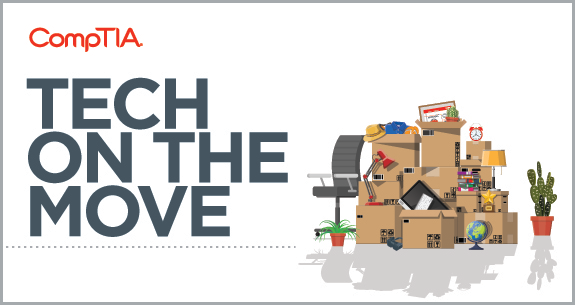
Tech on the Move
Tech workers are willing and ready to move for the right job, especially if it’s to an area with low cost of living, desirable climate and shorter commute times.
Once upon a time if your dream was to be successful in technology you had to be in Silicon Valley. But with the industry evolving and a new generation of workers placing more of an emphasis on quality of life, new tech hubs popping up across the country are changing that narrative.
The new story goes like this: Tech workers are willing and ready to move for the right job. CompTIA research backs that up, showing that 78% of IT pros have moved, considered or would consider leaving their current city for a new position particularly if it’s to an area with a lower cost of living, desirable climate and shorter commute times. This second installment of the CompTIA Tech Town Index provides IT workers, as well as professionals working in the business of technology, some guidance on where opportunity intersects with affordability and quality of life.
Based on job posting data over a 12-month period (August 2018-July 2019), CompTIA looked at 20 metropolitan areas with populations over 250,000, where demand for tech workers is greatest. The cities were then ranked based on cost of living, number of postings for open IT positions and projected job growth over the next 12 months and the next 5 years. Read more about the methodology.
The moral of the story is that there is a need for an educated, tech-ready workforce nationwide. The 2019 index includes predictable mainstays like San Jose (no. 3) and San Francisco (no. 5) and up-and-comers like Columbus (no. 12), San Diego (no. 17) and Tampa (no. 19) as well as some surprises, like Jacksonville, FL (no. 18).
Bolstered by a booming economy, Austin, Texas takes the top spot this year, with Raleigh again claiming second place. A mix of coastal and southern cities round out the top 10, including Seattle, Charlotte, Dallas, Atlanta and Huntsville, Alabama—with the Mile-High City (Denver) making the cut as well.
The 2019 list includes many repeat cities—16 to be exact—although interestingly enough, some have shifted in the rankings quite a bit. Of course, the introduction of four new cities means that four other Tech Towns fell off the list from last year (Trenton, New Jersey; Madison, Wisconsin; Des Moines, Iowa; and Lansing, Michigan). Washington, DC continues to be a hotbed of opportunity, with the highest number of IT job postings in this year’s list (not to mention the announcement of the new Amazon H2Q in Arlington) and newcomer Columbus, Ohio took the top honors in the cost of living category this year. The no. 1 tech town, Austin, took top spots in job growth in both the 1-year and 5-year projections.
Ultimately, the CompTIA Tech Town Index illustrates that IT pros are in demand and have nearly endless options when choosing where to live and work. With overall cost of living an essential to 82% of tech workers, and nearly two-thirds citing weather and commute times as important factors as well, the good news is that tech workers have the opportunity to write their own stories.
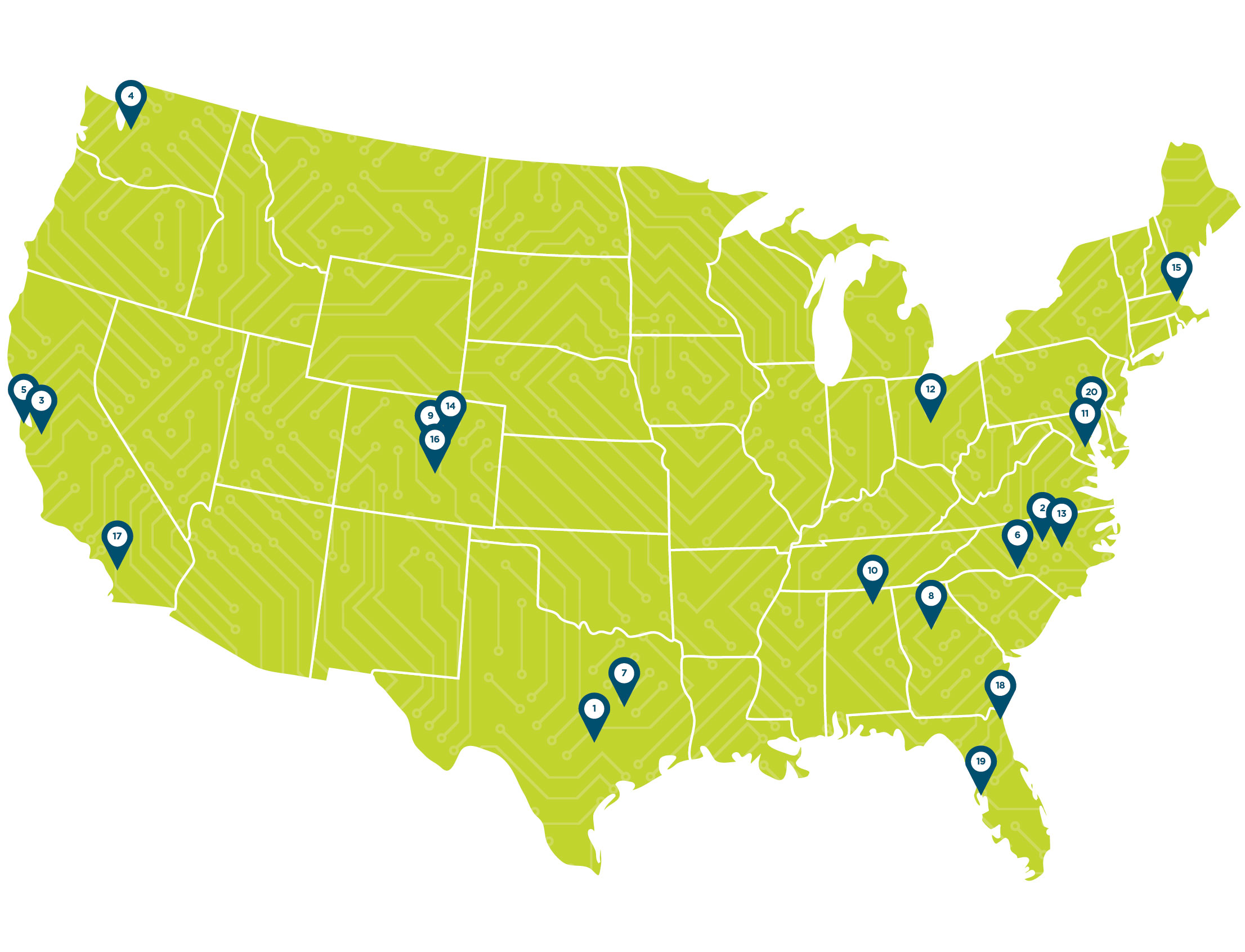
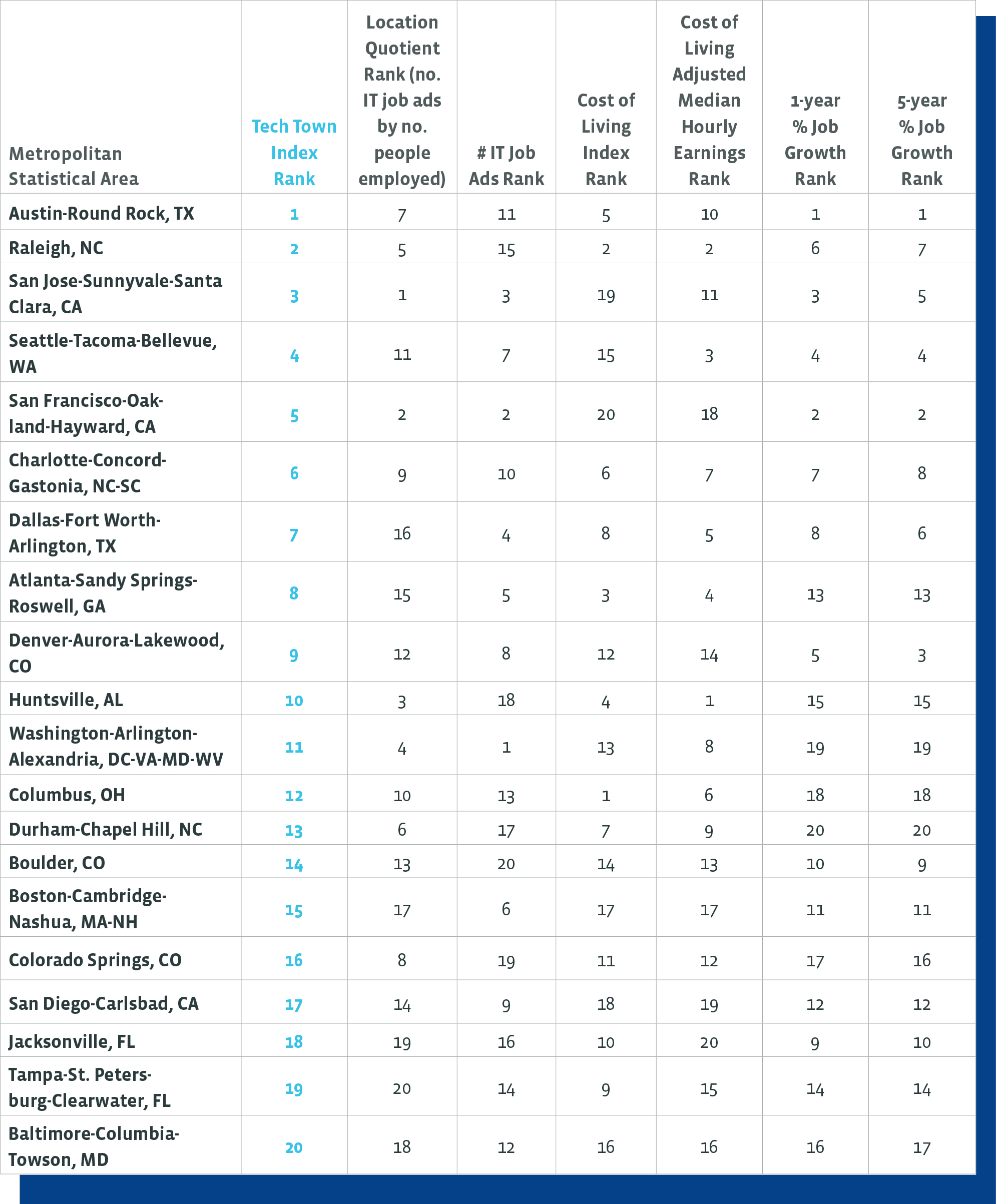
Big tech is getting even bigger in Texas—specifically in the Austin-Round Rock metro area, which jumped to the top spot on our Tech Town list, up from no. 3 in 2018. In Austin, the name of the game is job growth. According to Crunchbase News, in 2018 alone, the Austin Chamber of Commerce recorded 46 tech company relocations to the area. Already home to companies like Dell, IBM, Google and Apple (which recently announced a $1 billion investment for a new campus), the city is attracting more top players.
One of the most notable additions to the Austin skyline is Microsoft Office cloud competitor Zoho. Zoho announced plans to transplant its headquarters to Austin from Pleasanton, California early this year. Eventually up to 500 employees (primarily in customer service and technology assistant roles) will fill a 100,000-square-foot building the company is planning to open in 2021.
Rookie companies are also finding their place in the “Silicon Hills.” Local Austin startups like RigUp and DISCO raised a collective $400 million in venture capital in January 2019. Austin’s reputation for “weirdness” is among the many reasons newbie tech companies are choosing it as their home base, with the hope that the city’s progressive culture and out-of-the-box thinking will inspire innovation.
Pair exponential job growth with a booming real estate market, great schools, a thriving nightlife and an active, outdoor lifestyle, and it’s easy to see why so many people are moving to Austin. Of course, increasing interest in Austin means that prices in the area are going up. But the overall cost of living in the metro area still remains 3.5% lower than the US average. That’s a bonus for local IT pros who earn a median salary of $88,729. In the past year alone, nearly 49,000 tech jobs were posted in Austin-Round Rock and the number of jobs is expected to grow by 4% in the next year and a whopping 16% over the next 5 years.
For now, Dell still has the greatest number of job postings for IT positions, with its headquarters located in Round Rock. But as the list of tech companies calling Austin home continues to grow, it’s safe to say that Austin is a tech hub worthy of its reputation.
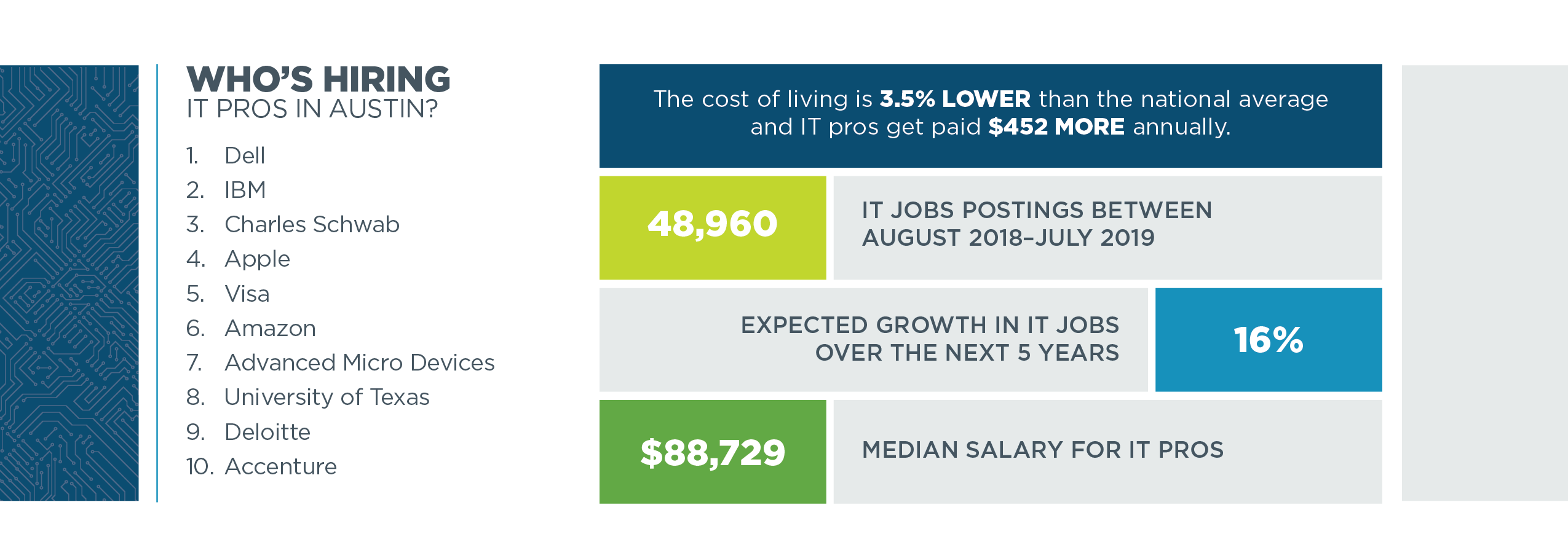 Back to top
Back to top
Raleigh’s unique economy continues to attract technology professionals looking for something new. Home to companies specializing in tech and biotech, as well as a large medical industry, the Raleigh metro area holds its no. 2 place on our Tech Town list. Surrounded by research universities, innovative talent is readily available—and best of all, you don’t have to empty your savings to put down roots here.
The cost of living in Raleigh is 4.6% lower than the national average, and workers here get paid about $3,582 more each year—adding up to a median salary of $91,859 for IT pros. That means an IT pro’s paycheck allows for a better quality of life that, in Raleigh, could include its growing music and art scene, world-class theatres and museums, and proximity to serene beaches and mountains. And living in a metropolitan city that oozes Southern charm means that genuine hospitality is a staple of the laid-back lifestyle here.
Home to cloud tech firm Pendo, which recently joined the “unicorn” ranks with other North Carolina startups like Epic Games and Prometheus Group, job growth in Raleigh is in the cards. IT jobs are expected to grow by 3% over the next year and 9% within the next 5 years—and the city is ready. The “City of Oaks” is currently building Raleigh Crossing, a massive new mixed-used development downtown. In fact, Pendo will be recognized as the building’s signature tenant—just one example of how the future of Raleigh is being shaped by its tech-savvy talent.
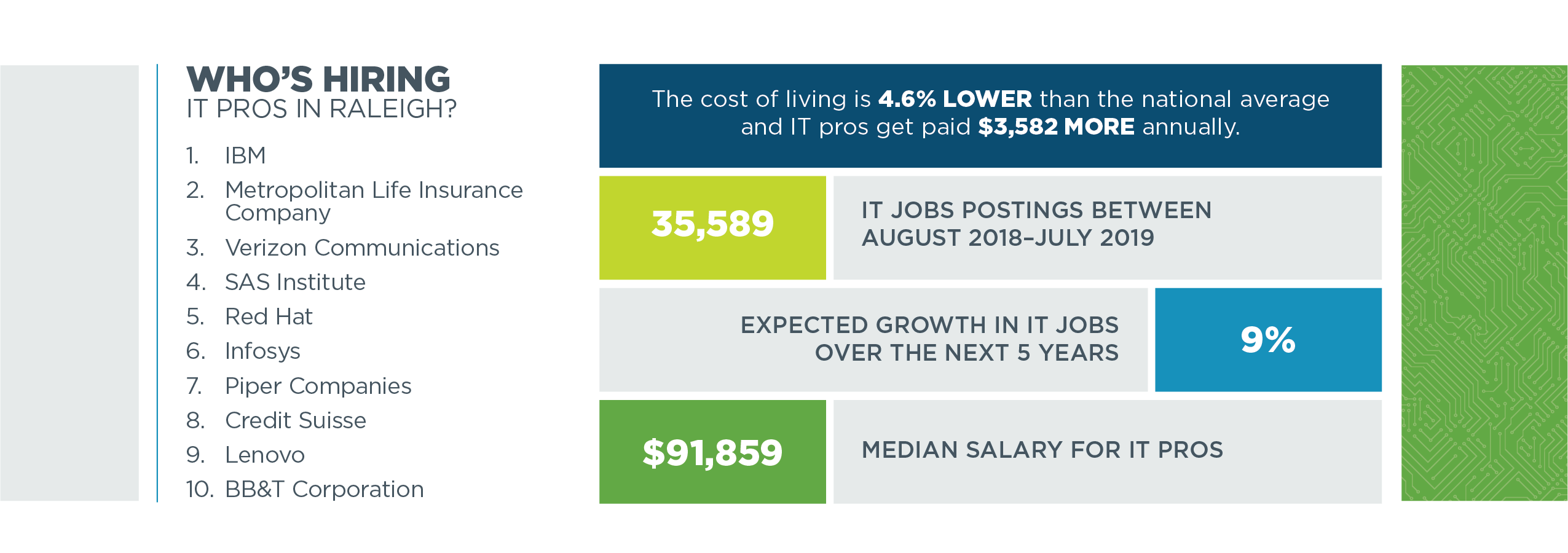 Back to top
Back to top
You don’t have to live in California to enjoy a lucrative career in technology, but if you’re willing to pay more in exchange for about 300 days of sunshine each year, then the San Jose area is the place to be. Jumping up one spot from 2018, the San Jose, Sunnyvale and Santa Clara metro area comes in at no. 3 this year. With more than 140,000 IT jobs posted within the last year, there’s no question why San Jose continues to be a mainstay on our Tech Town list.
Part of the infamous Silicon Valley, this area is home to giants like Apple, Google, Adobe, Cisco and more. With tech jobs expected to increase by 10% over the next 5 years, it’s clear the opportunity for IT pros is huge—but so is just about everything else. The cost of living in San Jose is 44.4% higher than the national average, and while tech workers earn a median salary of $129,365 each year, that figure translates to $89,837 when adjusted for cost of living.
With nearly 2 million residents, San Jose is one of the largest metro areas in the US and the largest in the Bay Area—and you can do just about anything here. Foodies flock to the San Pedro Square Market in downtown San Jose and serious shoppers head to Santana Row in West San Jose.
Outdoorsy types can make day trips out of hiking and camping in Yosemite National Park, partake in watersports in Lake Tahoe or enjoy wine tasting in Napa Valley. But there’s no question that San Jose’s thriving tech scene has made its diverse cultural mark on city as well. Many of the area’s neighborhoods have rich Asian, Latin, Vietnamese, and Central/South American flavors—like Japantown, a popular spot for visitors and residents alike. In an area known worldwide for its innovation, that kind of diversity is no surprise.
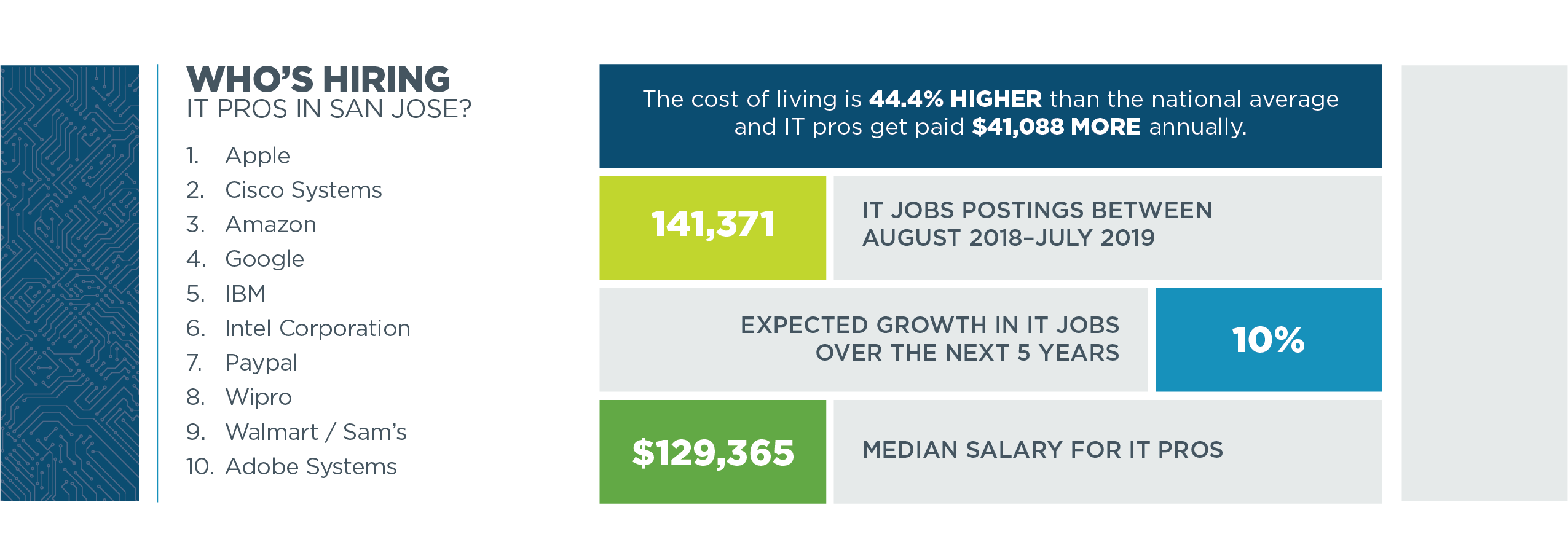 Back to top
Back to top
If you’re looking for big city opportunity with a small city feel, Seattle may be the place for you. Situated among rolling hills of pine trees, mountain ranges and deep-blue lakes, Seattle jumps three spots in 2019 to no. 4 on our Tech Town list. The jump in rank is well deserved as the Seattle-Tacoma-Bellevue metro area posted more than 81,000 tech jobs in the past 12 months alone—and that growth shows no signs of slowing down.
Technology jobs are expected to grow by 3% next year and by 11% in 5 years. That’s no surprise with tech giants like Amazon, Microsoft, Oracle and Facebook rounding out the top employers in the area. And for the first time Amazon surpassed Microsoft as the top tech employer in the city. Local IT pros earn a median salary of $115,826 here, and that big paycheck is necessary as the cost of living in this area is nearly 21% higher than the national average.
Historically known as a tech hub, the future of this Tech Town continues to be bright. Amazon’s investment in Seattle is notable, as is the fact that more than 100 out-of-town tech companies have staked out space in this city. Cloud-based digital dashboard, Flexport recently moved to Seattle from San Francisco; language-learning app Duolingo moved here from Pittsburgh; and home operating system Hello Alfred relocated from New York. All of these companies cite Seattle’s rich talent pool as the deciding factor in their decision to transfer operations. The translation from tech opportunity to tech jobs means that Seattle continues to live up to its storied history as one of the traditional tech towns.
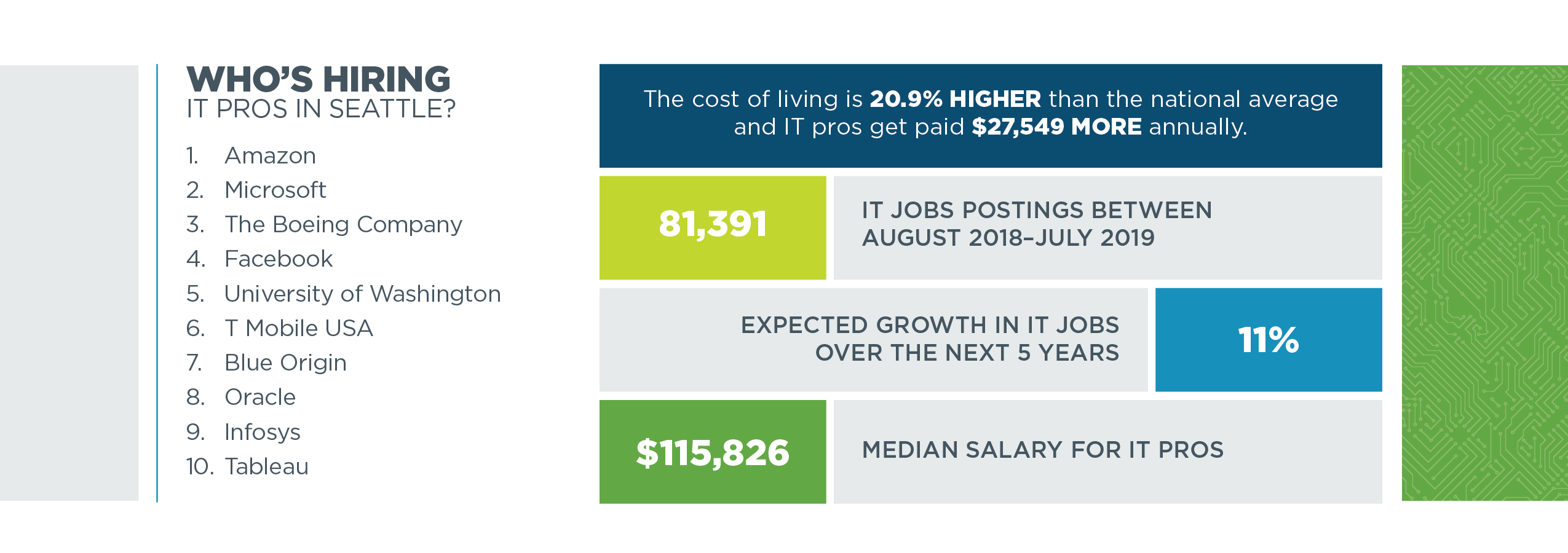 Back to top
Back to top
A combination of private capital, innovative talent, and state-of-the-art research and development facilities make the San Francisco Bay Area a winner year-after-year, which is why it holds its place at no. 5 on our Tech Town list. With major players calling the Bay Area home, there’s no surprise that this Tech Town continues to flourish. Last year the area claimed the top ranks in both 1-year and 5-year job growth and that kind of opportunity is still readily available. In fact, by 2024 the metro area is expected to see tech jobs grow by another 13%—outpaced only by our no. 1 city, Austin, Texas.
In the last year, the metro area posted nearly 167,000 technology jobs and companies like Salesforce and Uber are forking over big bucks for office space in the city. According to Los Angeles brokerage CBRE, tech firms made up more than 60% of all leasing activity in San Francisco in 2018—the highest percentage in four years. And if companies are digging into their wallets, you can be sure that residents are too. The cost of living in the Bay Area is a whopping 65% higher than the rest of the country with IT pros earning a median salary of $121,412. Keep in mind, that figure translates to just $73,583 when adjusting for cost of living. Just this year, a 200-square-foot “shed” made the national news when the owner listed it for rent for more than $1,000 a month.
But is the opportunity worth it for tech pros in San Francisco? Consider this: Privately held startups worth more than $1 billion are aptly referred to as “unicorns,” given that these uber successful startups are usually a rarity. But in the Bay Area there are 88—more unicorns than any other region of the world—which may not come as surprise given the city’s tech reputation. So, if you’ve got big ideas, the benefits of being at the epicenter of tech in the US may outweigh the costs.
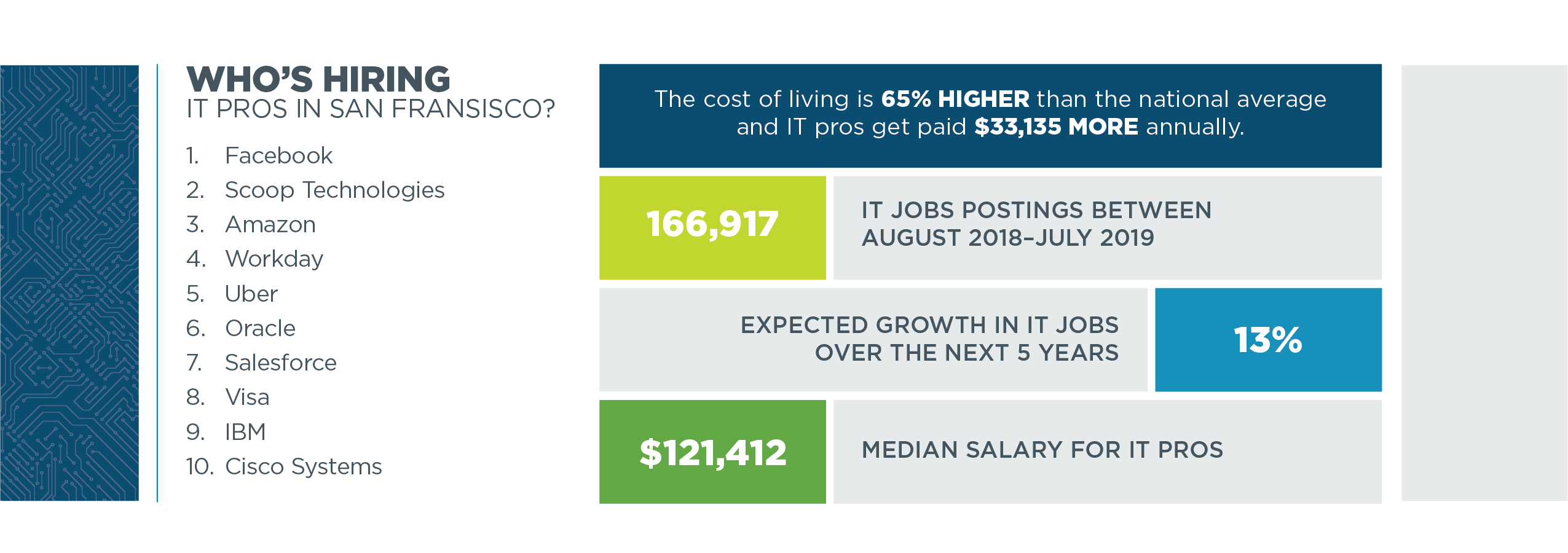 Back to top
Back to top
Last year, Charlotte topped our list of Tech Towns. And while there are many reasons the metro area still comes in at no. 6 on our list this year, long-term job growth is one of the reasons why the Charlotte-Concord-Gastonia metro area just misses the top 5. In 2018, the Charlotte area showed signs of an 11% job growth over the next 5 years. That number has slipped just a bit. While the tech industry is still growing here, the growth projection by 2024 is now 9%. But don’t let that fool you—this Tech Town is still putting its money where its mouth is.
Recognized as a major banking hub, companies in Charlotte’s financial sector are redefining what it means to be a tech company. With lots of competition and open positions for developers, software engineers and data analysts, the metro area posted a total of 52,357 tech jobs in the past 12 months alone. On a separate measure, the number of IT jobs is expected to grow by 3% over the next year.
Even with a slightly lower projected 5-year job growth rate compared to last year’s, the Charlotte market offers businesses a chance to evolve within a flourishing tech scene, and offers IT pros an opportunity to flex their entrepreneurial muscles while earning a median salary of $91,617 ($3,340 more than the US overall annually) in an area where the cost of living 2.5% lower than the national average. Transplants to the area frequently describe Charlotte as “manageable”—meaning the weather is more manageable than Florida, for example. And living expenses are more manageable than New York. More disposable income is a big win. In a town where finances rule all, the numbers don’t lie—Charlotte continues to be a tech magnet.
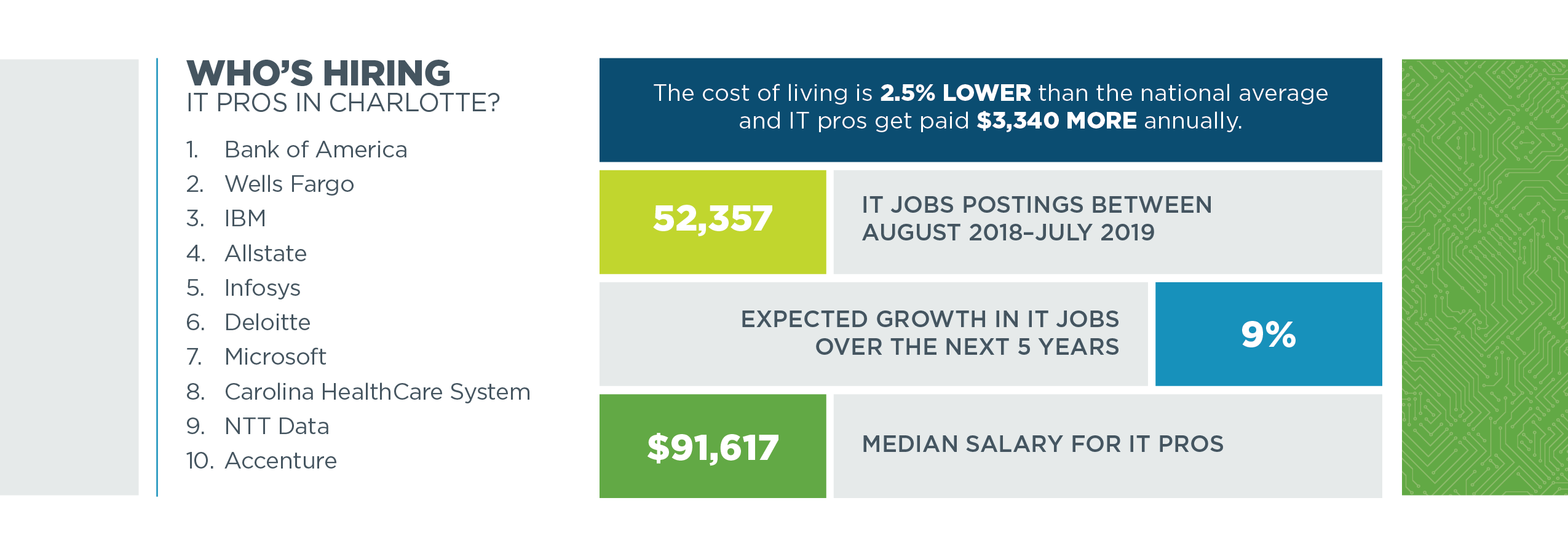 Back to top
Back to top
While the Dallas metro area has long been known as the home of corporate giants like American Airlines and Bank of America, it’s also becoming one of the best places to launch a startup. Perhaps that’s due to the fact that more than 60% of the Dallas population are under working age—making it a virtual pot of gold for future tech talent and landing the area no. 7 on our Tech Town list.
According to Forbes, fast-growing venture capital funded startups, a higher rate of job creation and comparatively lower real estate costs are backing up Dallas metropolitan as one of the top hi-tech cities in the country, and we couldn’t agree more. In fact, in the past 12 months, Dallas-based companies posted nearly 134,000 tech jobs. In addition, the number of IT jobs is expected to grow by 10% over the next 5 years. The top two most in-demand jobs posted in Dallas are software development engineers and Java developers. And, IT pros make a healthy median salary of $93,058 in the “Big D.”
The lively Dallas-Fort Worth area is home to plenty of live music and sports attracting young professionals, while the outlying suburbs tend to appeal to young families. Both demographics are flooding the area. The population in 2005 was about 5.8 million and today stands at more than 7.1 million. With the cost of living just slightly lower than the national average (1.1% lower) and affordable home prices, companies and IT pros of all ages are flocking to Dallas.
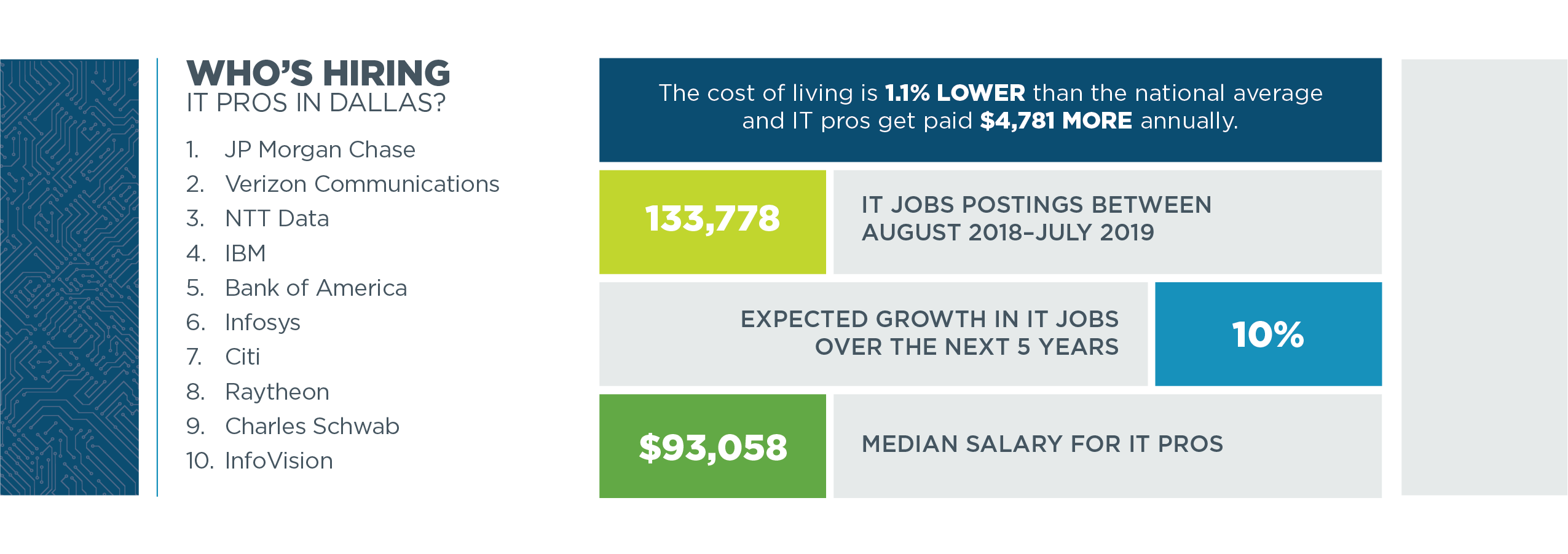 Back to top
Back to top
Home to the Atlanta Tech Village—the 4th largest tech hub in America per the organization’s own research—the Atlanta-Sandy Springs-Roswell area is not only tech friendly, but entrepreneur friendly—one of the many reasons this metro area has jumped one spot from no. 9 to no. 8 on our Tech Town list this year.
The burgeoning Atlanta tech ecosystem begins with an abundance of talent coming out of high-quality educational systems like Georgia Tech, Emory University and Morehouse College. And while in the past, there wasn’t as much funding available, nowadays the ripe venture market benefits from a combination of that talent, a somewhat low cost of labor, and a friendly business environment. A high concentration of global Fortune 500 companies and 20+ corporate innovation centers is solidifying Atlanta as a tech hub in its own right.
Atlanta’s southern hospitality may be to thank for its reputation as a diverse tech ecosystem. Entrepreneurs with diverse backgrounds, race, gender and ethnicity have found success here and they haven’t forgotten where they came from – by re-investing into the community that gave them their starts. That success begets success and translates into jobs.
Just last year more than 100,000 tech jobs were posted. And, the number of IT jobs is expected to grow by another 7% in the next 5 years. Software development engineers and Java developers are the most in-demand IT pros in this area, followed closely by solutions architects and data analysts. With the cost of living 4.2% lower than the national average and a median salary of $91,209 ($2,932 more than the US annual median), IT pros near and far are targeting Atlanta.
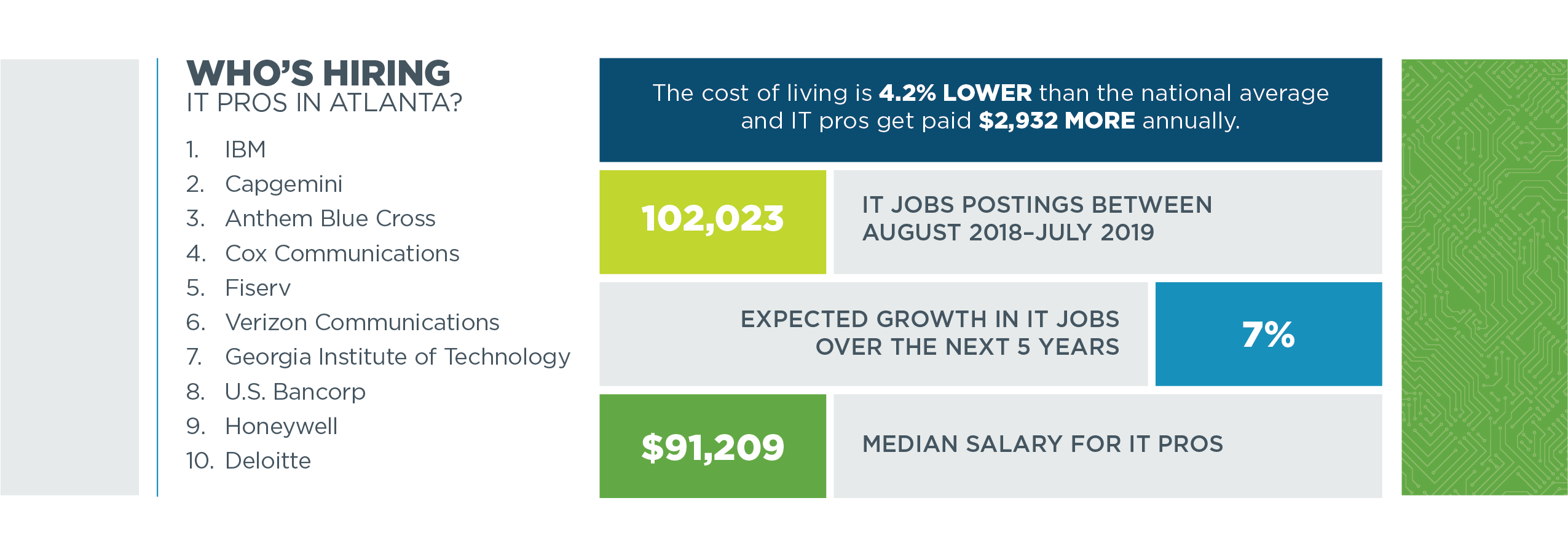 Back to top
Back to top
It may surprise you that Colorado is the fifth-fastest growing state in the country, according to the latest US Census. But that doesn’t surprise native Coloradoans. A thriving economy that continues to grow and a healthy work-life balance—made possible, in part, by the picturesque outdoor surroundings—mean the Denver metro area sits at a solid no. 9 on our Tech Town list.
According to the Denver Post, Colorado’s job growth is the strongest and most consistent it’s been since the mid-90’s. Our data backs that up. For example, in the last 12 months 60,548 tech jobs were posted. And while the number of IT jobs is projected to grow by 3% in the next year, it will swell by 11% over the next 5 years. Companies like Dish Network, Raytheon and CenturyLink are among the top companies hiring technology professionals for in-demand jobs like software development engineers. Denver area IT pros earn a median income of $97,719 a year. And that seems to be enough to recruit top tech talent. LinkedIn’s latest Workforce Report named Denver as the second-most moved-to city by 20- and 30- somethings.
Although the cost of living is about 15% higher than the national average, it still falls well below the likes of Silicon Valley—and, offers just as much opportunity as the city develops incentives to attract new businesses. Making Denver business-friendly means offering low corporate tax rates and access to an educated workforce as well as providing a variety of resources. Plus, after Colorado residents voted to legalize recreational marijuana in 2012, the city has also seen an increase in cannabis-related commerce, including high-tech paraphernalia—making Denver even greener.
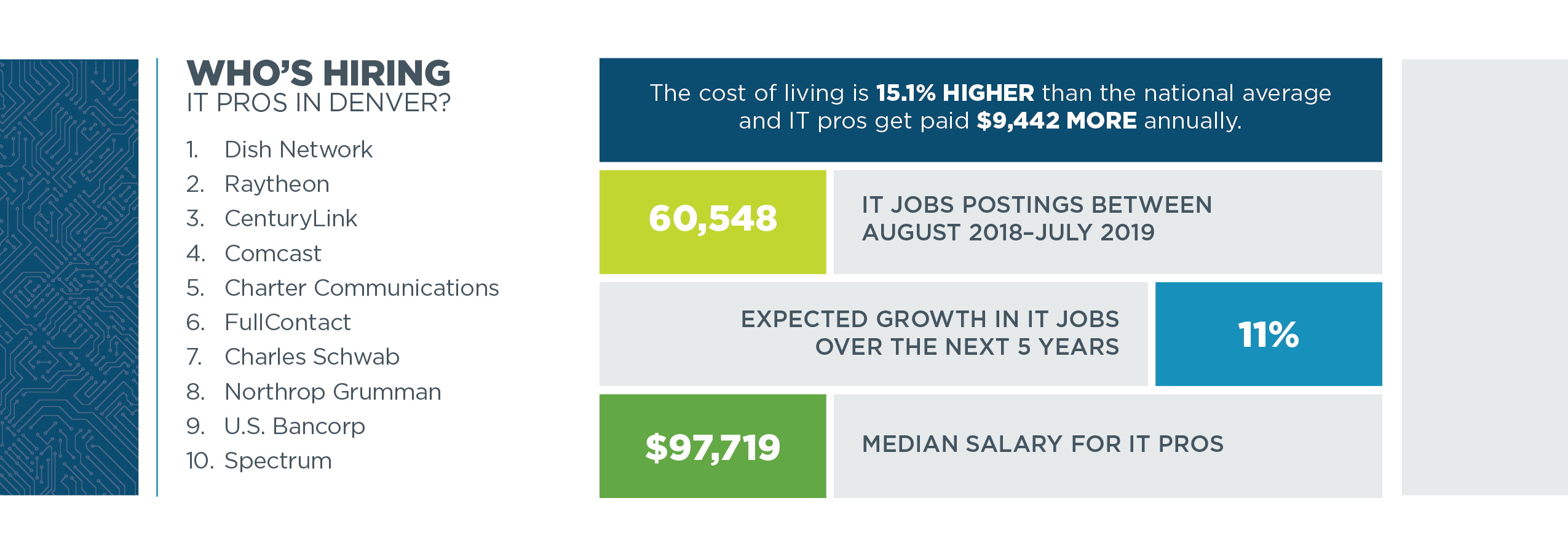 Back to top
Back to top
Rounding out the top 10 (and holding its 2018 place) is the Rocket City itself, Huntsville, Alabama. Best known as home to the US Space and Rocket Center, NASA’s Marshall Space Flight Center, and the Army’s Aviation and Missile Command, technology is certainly nothing new to this area. However, since Huntsville residents enjoy a cost of living 4% below the national average, what may be one of the best kept secrets is quickly blossoming into a well-known tech hub for both startups and mature businesses.
Over the last 12 months, Huntsville metro area companies posted nearly 15,000 tech jobs. On another measure, the number of tech jobs is expected to increase by 6% within the next 5 years—and the city is ready. Many groups around town, like Urban Engine, provide resources to help entrepreneurs get started. Of course, this focus on startups only benefits Huntsville by bringing new jobs and new people to the area.
According to the Alabama Media Group, Huntsville added more people than any other city in the state in 2018—and the Huntsville housing market is responding. The latest numbers from the Huntsville Area Association of Realtors (HAAR) show that people are buying at record rates. The average sales price of a home in the area is $248,270, which is well within the grasps of local IT pros who make a median salary of $95,597. Huntsville and next-door neighbor Madison are also reacting to the surge in growth by asking residents to increase their property taxes in the name of school overcrowding. Voters approved the hike this fall to pay for construction of two new schools and high school expansions to accommodate students. But growth is just one piece of the puzzle. Huntsville leaders have created a digital plan called “The Big Picture” that details the city’s future for decades to come.
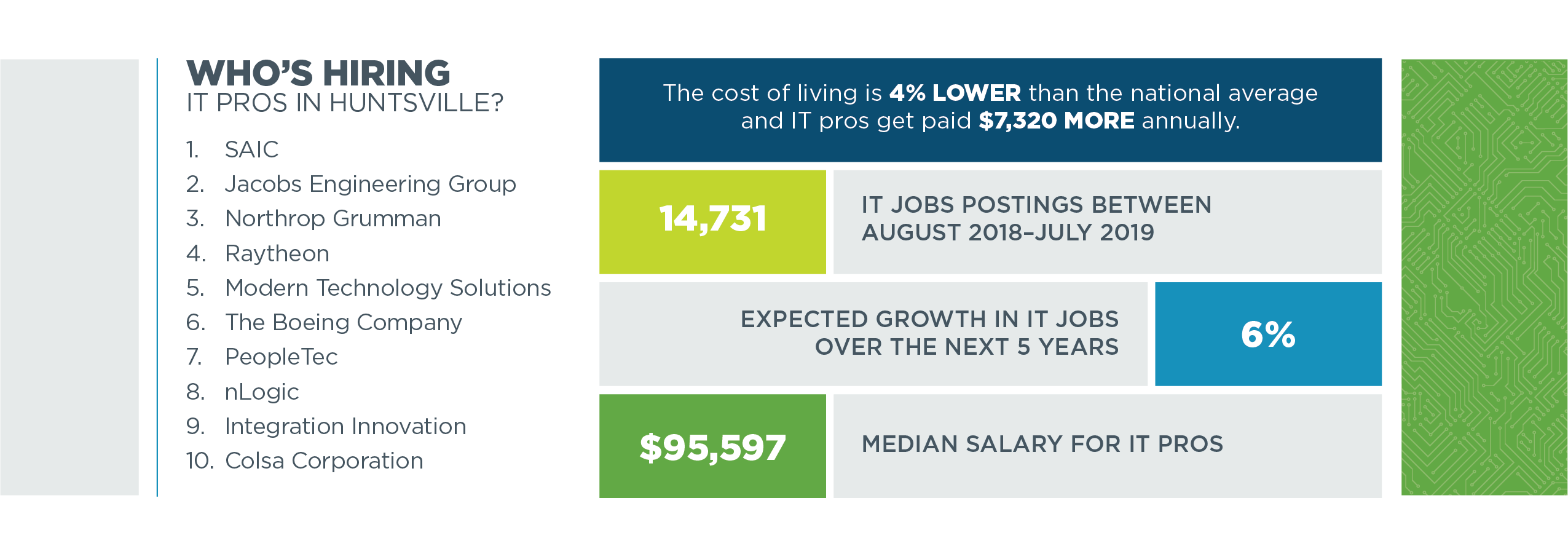 Back to top
Back to top
The need for government contractors in our nation’s capital is what propels Washington, DC numbers up—way up. In last year’s Tech Town Index report, 170,000+ technology jobs were posted in this metro area, and while that’s a hard number to beat, leave it to DC to best that by more than 20,000 new job ads. Specifically, in the past 12 months nearly 192,000 jobs were posted, the most of any other Tech Town on our list.
Nearly 22,000 of those job postings were for software development engineers, systems engineers and Java developers. In addition, total IT job numbers are estimated to grow by 4% by 2024, and likely even more so with Amazon’s HQ2 setting up shop in Arlington’s Crystal City neighborhood. The plan is for Amazon to develop two 22-story buildings located at Pentagon City’s 16-acre Metropolitan Park area. The urban campus concept will also include retail and open space and be the work home of a reported 50,000 workers. But for now, Amazon’s economic impact isn’t about demand for tech workers. While preparation for actual hiring is taking place, other factors, like the housing market are taking a front seat.
According to the Northern Virginia Association of Realtors, inventory is very tight right now and part of the problem stems from homeowners putting off sales hoping to reap higher prices when HQ2 starts staffing up. In an area where the cost of living is already 16.7% higher than the national average, supply and demand may dictate even higher home prices in the near future. Still, local tech workers earn a median salary of $109,019 here, translating to $93,179 when adjusting the cost of living. And with opportunity ripe and competition tough, the DC metro area remains a top contender for IT pros to start and grow their IT careers.
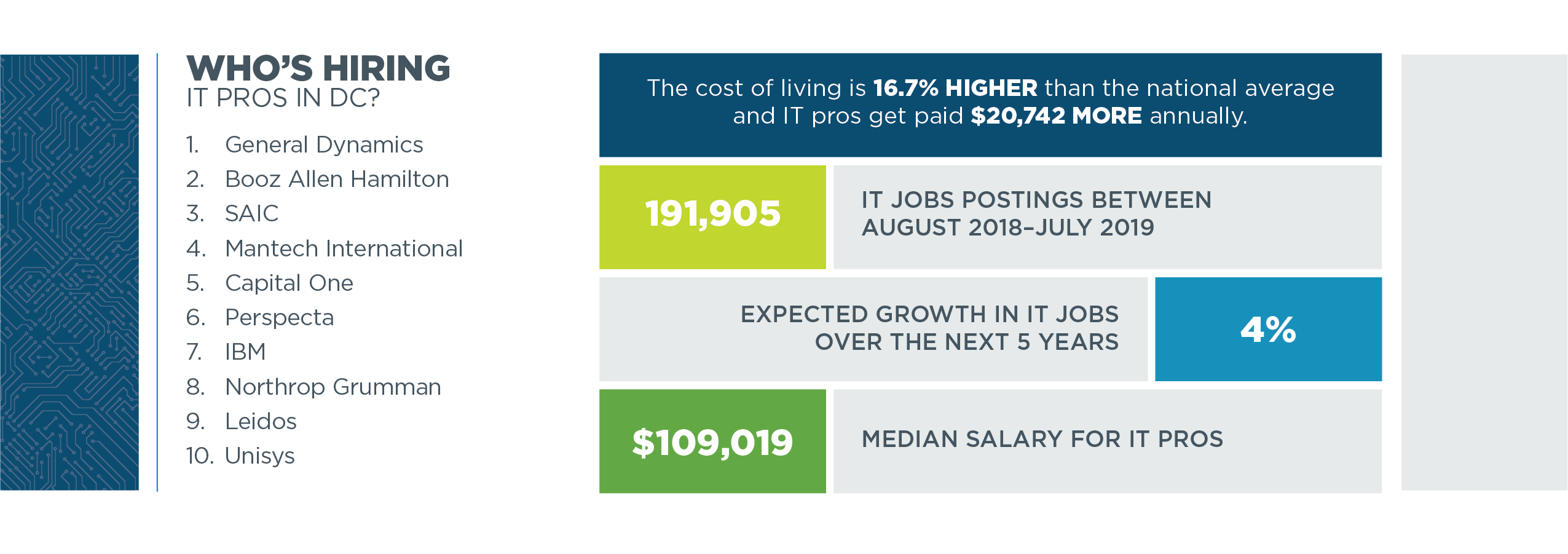 Back to top
Back to top
Making its debut on our Tech Town list, Columbus, Ohio may be on your radar if you’re a college football fan, but touchdowns aren’t the only thing this community is celebrating. The Columbus metro area has been working on a resurgence of sorts, which was necessary after the collapse of the mighty manufacturing industry that held the state up for decades. Placing a new-found emphasis on technology, higher education and smart manufacturing has resulted in more than 44,000 tech jobs posted over the last 12 months alone.
That kind of opportunity combined with the lowest cost of living on our list—5.1% lower than the national average—makes the capital of the Buckeye state appealing to companies and tech pros alike. According to JobsOhio, corporate operating costs for the many tech transplants are 70% lower than Silicon Valley. That could be why Google recently announced plans to build a data center in nearby New Albany (about 15 miles northeast of Columbus), adding 50 permanent jobs and investing $600 million into the area. According to the city of New Albany, the expected revenues from Google beginning in 2021 is equivalent to a $37.5 million payroll.
But thanks to the sprawling Ohio State University and a wide variety of businesses, the quality of life may be the biggest draw of all. Local tech pros earn a median salary of $88,980 in the Columbus metro area—an attractive figure for a region that caters to a younger crowd and allows for plenty of indulgence in local food, art, music, festivals—and of course, college football.
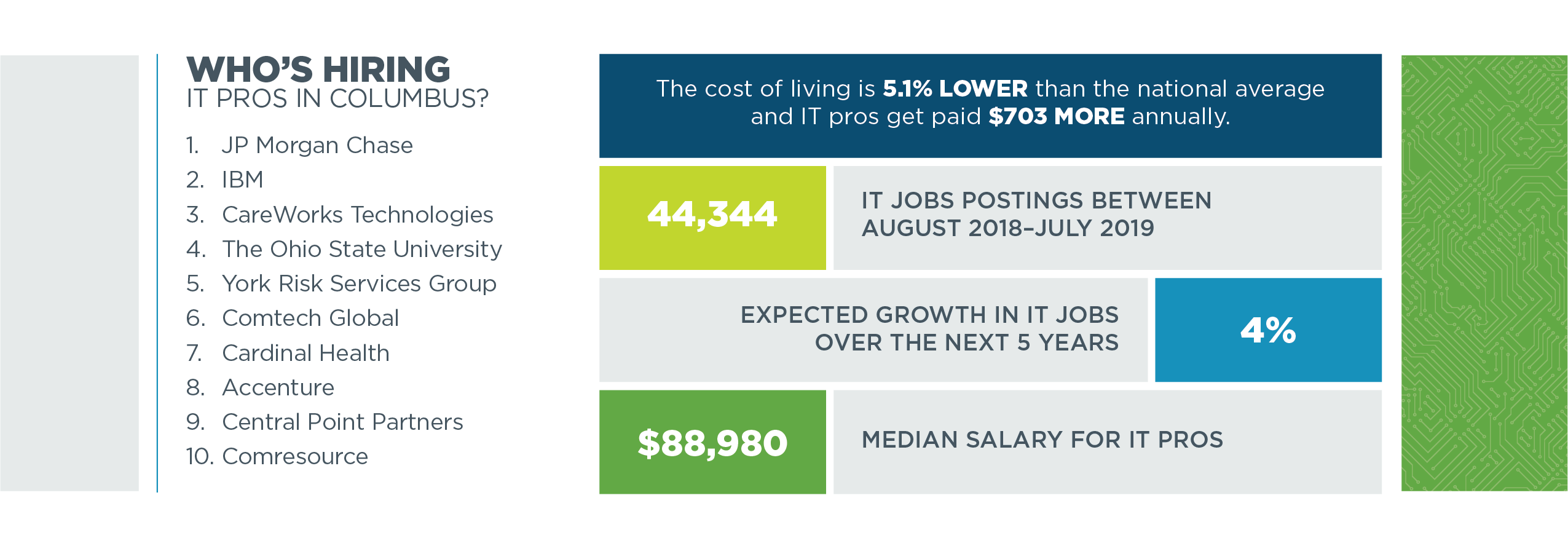 Back to top
Back to top
There’s a plethora of smart people in Durham and Chapel Hill. While that may be a bit of a subjective statement, the fact is Research Triangle Park is the epicenter of North Carolina’s tech research and development. The sheer proximity to three major research universities as well as a bright entrepreneurial community are just a few of the reasons that the Durham-Chapel Hill metro area has moved up two spots from 2018 to no. 13 on our Tech Town list this year.
Home to the Center for Entrepreneurship Development (CED), Durham is creating a reputation for itself as a top startup ecosystem—making WalletHub’s list of the 10 best large cities to start a business. And even with a highly educated workforce and talent pipeline, there’s still plenty of opportunity. In the last 12 months the metro area posted nearly 17,300 technology jobs. Looking ahead, the number of IT jobs is estimated to grow by 3% over the next 5 years.
With a cost of living slightly lower than the national average (1.4%) and IT pros making a median salary of $91,156 per year, the area is an attractive option for a wide variety of folks. Durham-Chapel Hill transplants include those looking to start or further their IT career as well as young baby boomers who want to keep working in tech but also have a desire to be close to grandchildren and enjoy the benefits of lower property taxes.
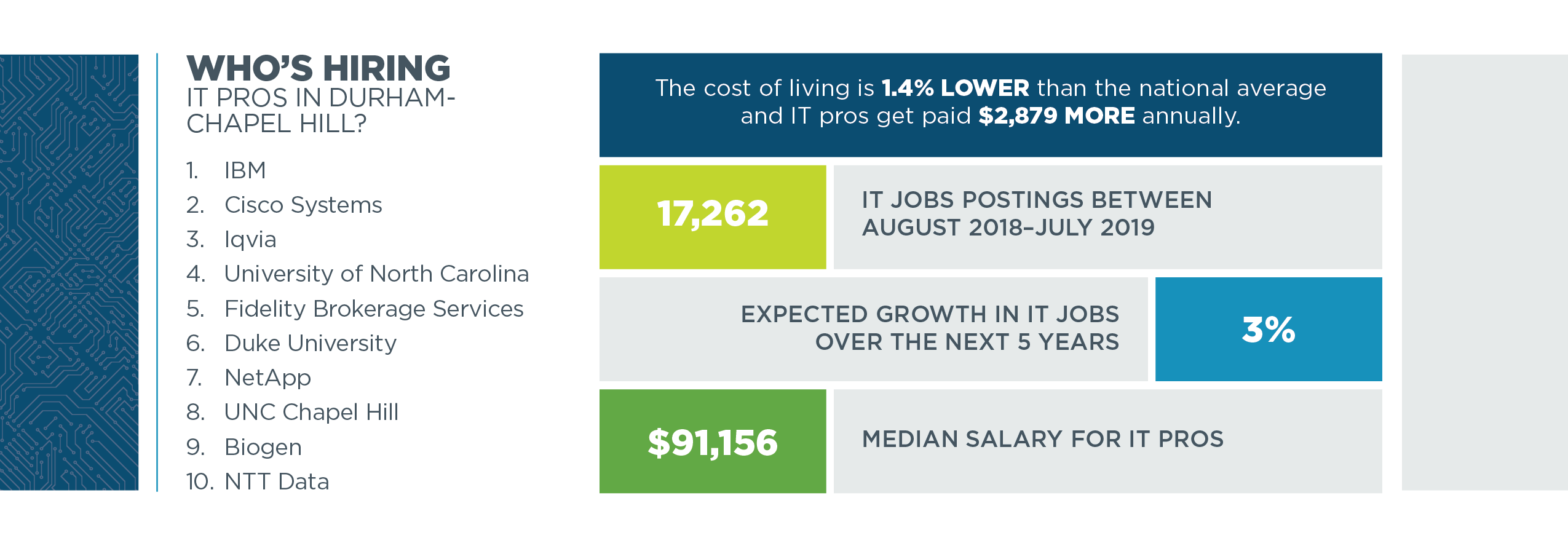 Back to top
Back to top
Boulder, Colorado was founded in 1859 by explorers seeking the riches of gold. Fast forward 160 years and those riches have been realized—in the form of a vibrant, healthy tech ecosystem that caters to small business. That ecosystem is one reason why this idyllic mountain city comes in at no. 14 on our Tech Town list (up from no. 19 last year). Why the jump? In short, the answer is growth in all ways.
The original home of Ball Aerospace (one of the first NASA contractors), the bustling Boulder tech scene is comprised of companies in aerospace and bioscience as well as a flurry of new startups. In fact, in 2018, Colorado broke its record for venture capital investment in a year, with $1.6 billion raised, according to a recent Pitchbook report. Home-grown experts expect those funds to continue to be invested locally—perhaps a contributing factor to the metro area’s nearly 7,500 new tech jobs posted last year alone (up 1,600 from last year’s study of the prior 12 months). And the continued outlook looks even better than it did before. Last year, the data showed an estimated 5% growth over the next 5 years. In 2018, that expected growth jumped to 8% by 2024.
But even a picture-perfect mountainside city has its challenges. Tech execs say the physical lack of city space, congestion and parking obstacles can make running a business in Boulder difficult. Additionally, the cost of living here exceeds the national average by 16.7%—although tech workers do make a median annual salary of $99,772 to help offset those expenses. In fact, that median salary increased nearly $10,000 since 2017. But Boulder continues to thrive because residents love their community, their sunshine and the happy, healthy lifestyle it provides.
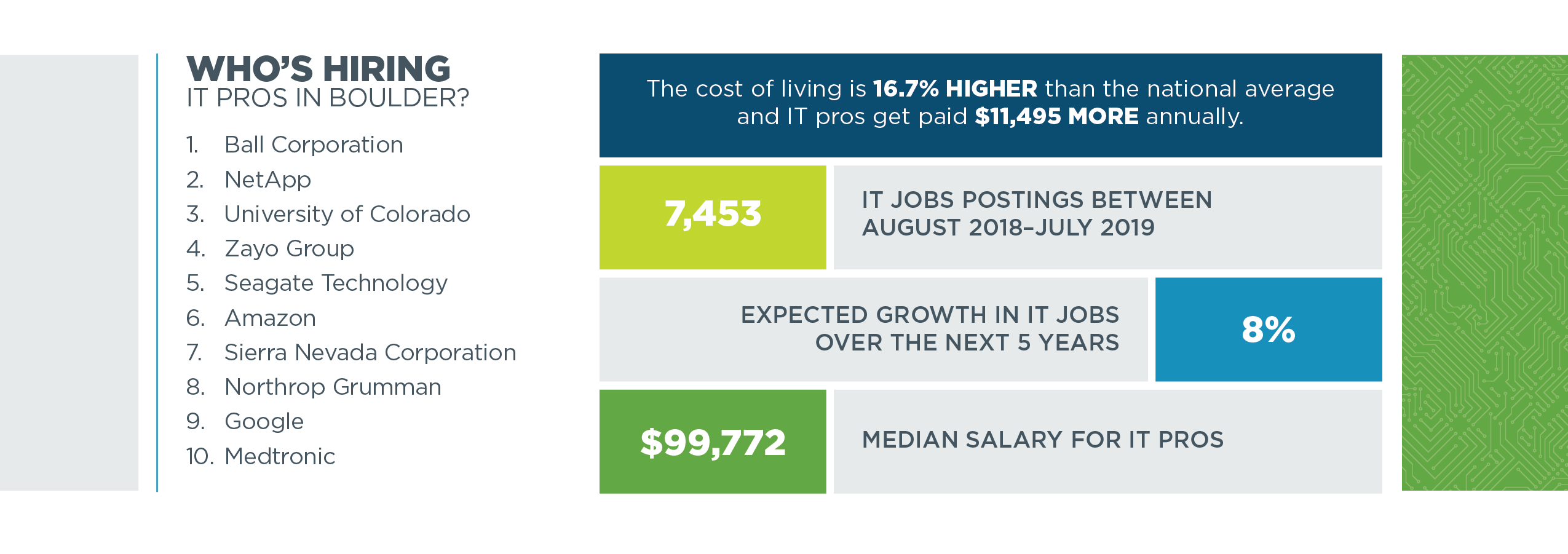 Back to top
Back to top
Known for innovative contributions to healthcare and biotech, the history-rich Boston metro area continues to lead the way for advancements in robotics, IoT and AI. Those advancements translate to more jobs and what some would call urgent workforce needs. Just last year, nearly 95,000 tech jobs were posted in this area—landing it no. 15 on our Tech Town list.
Even with a cluster of local universities nearby to fuel young talent, the Boston tech scene is outpacing itself due to its diversity of companies. For example, according to Crunchbase data, Boston-based startups working with food (think, catering and plant-based protein) have recently raised significant funding. Boston also ranks first in the nation as a place to start social ventures, according to a 2017 report from Halcyon. And with a 7% expected growth in IT jobs over the next 5 years, Boston has solidified itself as a major tech hub.
Of course, living in Bean Town has a few downsides—the first and foremost being the cost of living. While Boston-based IT pros earn a median salary of $101,243 per year, the cost of living is nearly 34% higher than the national average. In fact, the only other cities on our list that are more expensive to live in are San Francisco, San Jose and San Diego. National real estate listing service RENTCafé lists great deals in the Roxbury, Roslindale and East Boston neighborhoods where average rent hovers around $2,500 per month.
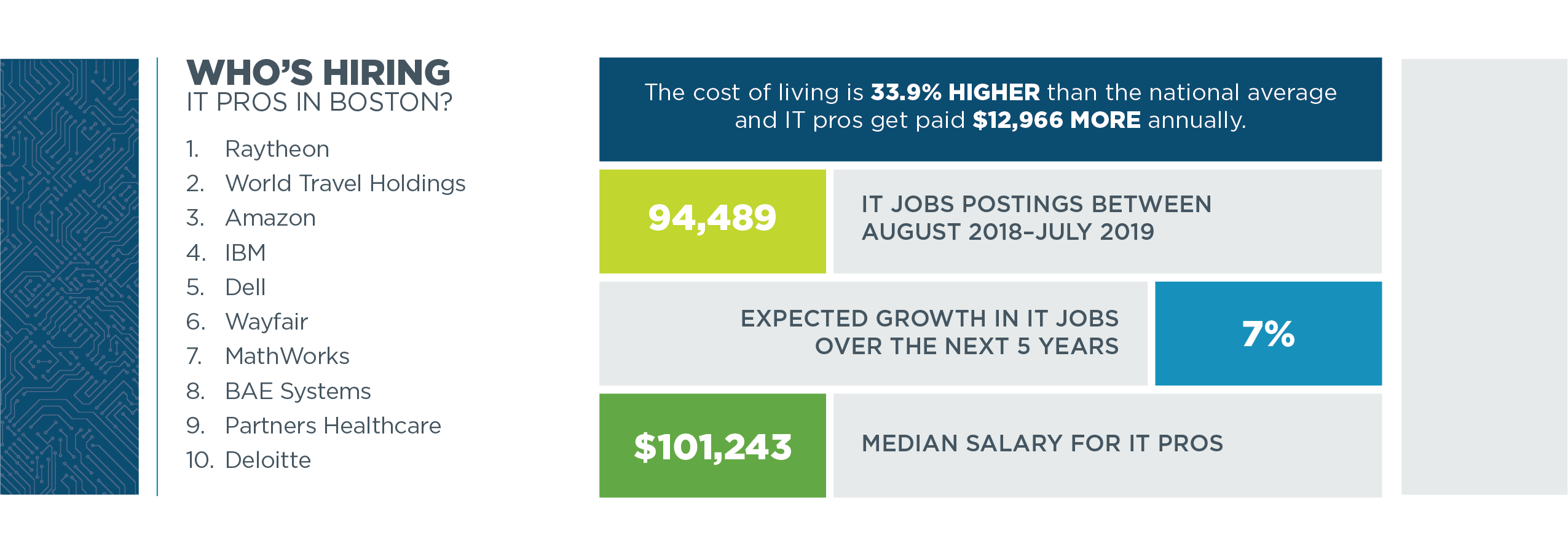 Back to top
Back to top
Historically the largest employers in Colorado Springs have been military bases, hospitals and school districts, but in recent years The Springs has been busy building a solid reputation as a noteworthy cybersecurity and tech hub. Jumping to no. 16 from no. 20 on our Tech Town list last year—due in large part to more job postings per number of people employed—the Colorado Springs metro area is drawing the attention of tech’s biggest players as well as small startups with big plans.
First, the big guns: This past spring, Amazon confirmed it will open its fourth permanent delivery station in Colorado Springs. The online retail giant employs more than 3,500 people statewide and this new station will add hundreds more to that number. In the past year alone, Colorado Springs companies posted nearly 13,200 technology jobs (about 4,700 more than at the time of last year’s report). Additionally, the number of IT jobs is expected to grow by 6% more in the next 5 years.
But the big guys aren’t the only players in this game. The state is seeing a consistent flow of companies of all sizes interested in opening or expanding their presence in Colorado, including organizations aimed at cultivating opportunities for innovators and investors to connect. These groups have targeted Colorado Springs in part due to key factors like population growth, affordability and a sustainable economy. This is all good news for local tech talent. While the cost of living has remained relatively the same in the past few years, the median salary has increased. Local tech workers earned a median annual income of $94,881 in 2018 (up from $90,438 in 2017). With those figures in hand, Colorado Springs IT pros are making similar salaries to those in nearby Colorado cities, but the cost of living is significantly lower than both Boulder and Denver.
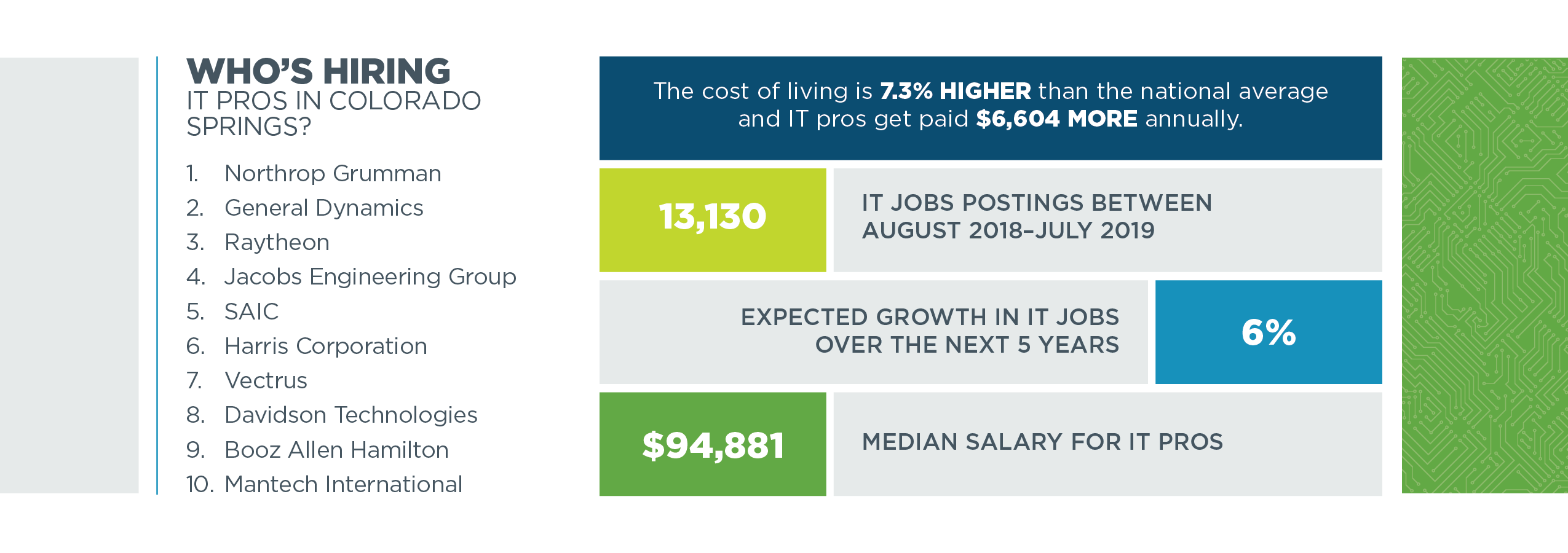 Back to top
Back to top
While San Jose and San Francisco reap the benefits of their world-class reputation in tech, scenic San Diego has been slowly growing into a booming software metropolis in its own right. These days, California’s southernmost city is getting well-deserved recognition for its software acceleration in biotech, genomics, healthcare and aerospace—accounting for the nearly 59,000 technology jobs posted in the last 12 months, as well as why San Diego is making its first appearance on our Tech Town list.
The original home to telecommunications giant Qualcomm, San Diego does have a history of innovative industry. But, the recent rise in the software scene here can be attributed to the evolution of technology itself. Tech execs say that companies are now less expensive to get started, thanks to new cloud technologies. In fact, San Diego’s promising stats also landed it on Inc. Magazine’s Surge City Index, a list based on seven key indicators including early-stage funding metrics and job creation. Currently, San Diego hosts 24 incubator and accelerator programs to drive startups.
Local tech talent in the aptly nicknamed “Silicon Beach” earn a median annual salary of $100,326, and software development engineers are the most sought-after jobs. And while a six-figure paycheck sounds like a good deal, the cost of living in the San Diego metro area is one of the highest on our list—more than 39% higher than the national average. That six-figure income adjusts to just $72,177 when you take cost of living into consideration. That said, if you’ve set your sight on living in the Golden State, San Diego is the most affordable California city on our list.
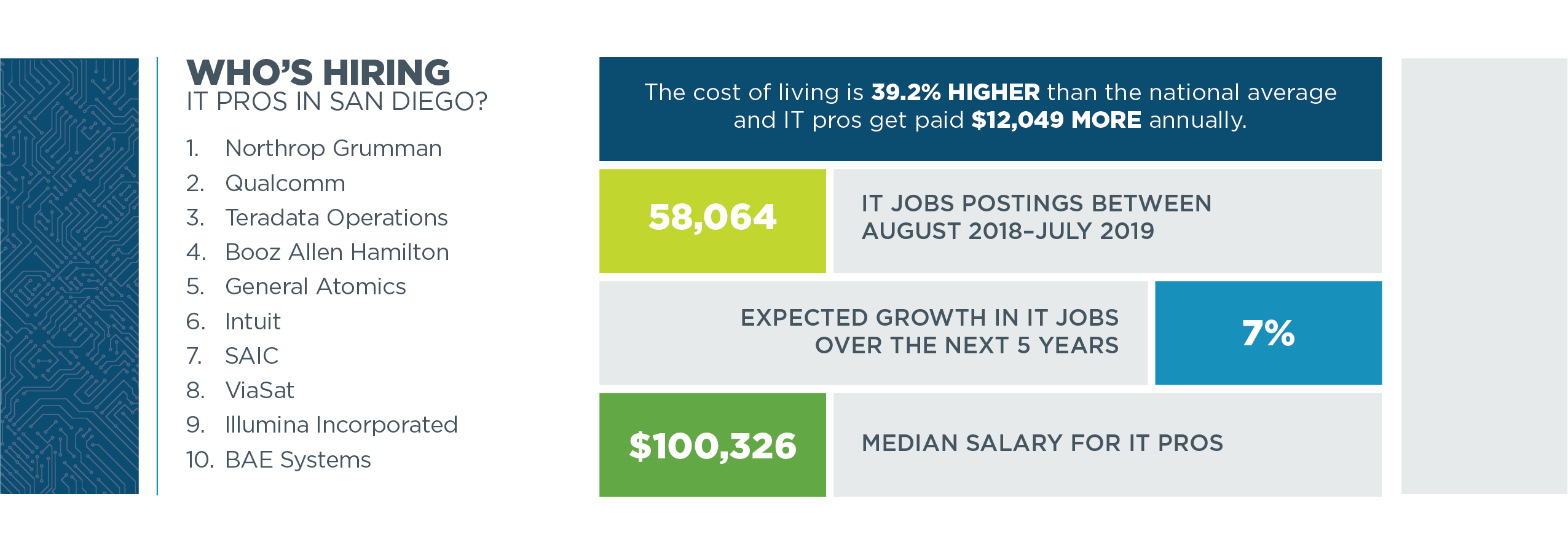 Back to top
Back to top
If there’s one stereotype Jacksonville, Florida would like to shake, it’s that only retirees call the sunshine state home. In fact, a growing number of millennial-aged adults are moving to Jacksonville. Maybe it’s the weather. Or maybe it’s because the area has been dubbed a promising tech hub seeing exceptional growth. In any case, advanced manufacturing, financial technology and healthcare are just a few sectors here growing by leaps and bounds and why the city makes our list this year, coming in at no. 18.
Jacksonville has been on an upward trajectory in terms of tech in the last few years. Amazon employs 4,000+ people here and JinkoSolar recently set up a major solar panel manufacturing operation. Additionally, the city is home to more than 20 healthcare facilities. With a surge of new activity, it comes as no surprise that in the past year alone the Jacksonville metro area posted approximately 22,500 IT jobs. And, the number of IT jobs is expected to grow by another 8% over the next 5 years.
IT pros in Jax earn a median salary of $74,801. That number may seem on the low side when the cost of living is 3.7% higher than the national average, but a thriving college landscape and lively startup community are attracting young talent. And, it certainly doesn’t hurt that the beach is essentially your backyard.
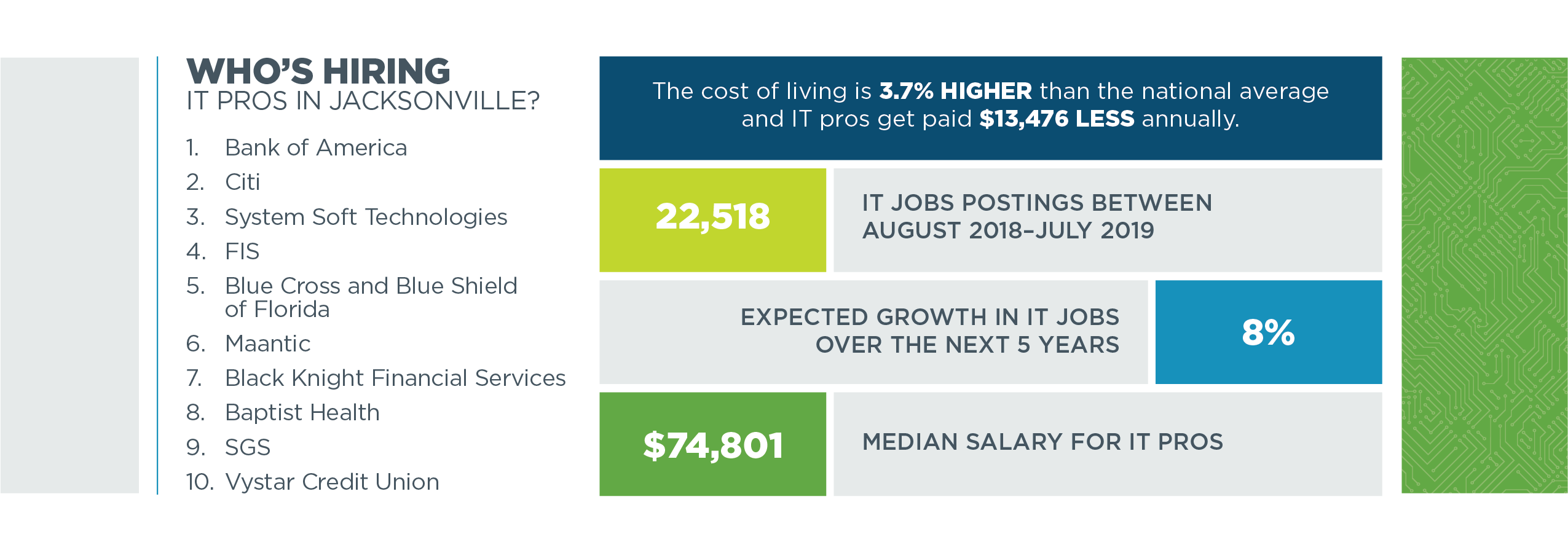 Back to top
Back to top
The Tampa Bay region, which includes Tampa, St. Petersburg and Clearwater, has long been considered a top vacation destination. But city leaders want more for this area and their efforts to transition the economy from one based on traditional construction, agriculture and tourism businesses to an economy built on technology are paying off. The investment opportunities in Tampa Bay are plentiful and the area is now home to more than 150 tech startups—just one factor leading to its debut at no. 19 on our list of tech towns.
In addition to the obvious perks of 75-degree days year-round and a daily dose of vitamin D, attractive tax structures and innovative research centers are just a few reasons why Tampa Bay has become so appealing. But perhaps the most important attraction is a clean slate—unchartered territory. With nearly 43,200 IT jobs posted last year and IT jobs estimated to grow by 6% in the next 5 years, Tampa Bay has the numbers to bolster this growth. In fact, Forbes recently named the area no. 2 on its list of “Top 10 Best Cities for Young Entrepreneurs.”
Companies like Citi, Verizon and WellCare are hiring in Tampa and local IT talent can expect to make a median salary of $79,553 a year. The cost of living is slightly higher than the national average—just 2.3% higher to be exact. When adjusted for cost of living, Tampa edges out Jacksonville in terms of getting more bang for your buck, and it is home to some of the most beautiful beaches in the state.
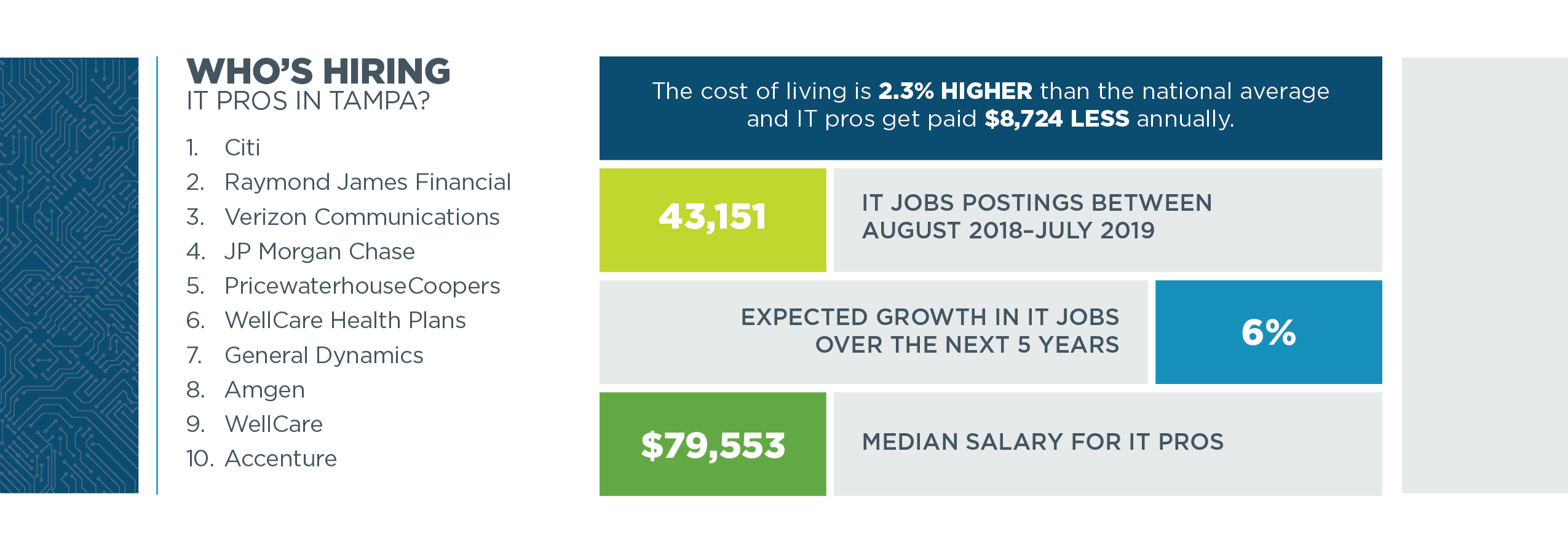 Back to top
Back to top
Rounding out our top 20 Tech Towns is Baltimore, Maryland. Situated in the Chesapeake Bay region of eastern Maryland, Baltimore is experiencing a population decline—losing an estimated 7,300 residents in the last 12 months according to recent Census data. While the Maryland Population Research Center hasn’t released specific demographics, a multitude of factors are being blamed for the exodus. One theory being that Washington, DC has had more success in attracting residents due to a strong economy and job base. But that hasn’t halted the city’s rise as a technology hub. In fact, the number of college-educated people between 25 and 34 has actually been rising, making it a tech talent goldmine for the state.
Known for its innovations in the tech and life sciences sectors—many coming from the University of Maryland and The Johns Hopkins University—the city’s tech environment is bolstered by quality workforce development programs, partnerships and funding efforts. And the tech ecosystem is notably all-inclusive. A recent study from SmartAsset ranked Baltimore as the no. 2 city in the country for women in tech—outranked only by neighboring Washington, DC.
By the numbers, Baltimore holds its own. Companies in the metro area posted more than 48,500 tech jobs in the last 12 months—many for software development engineers, systems engineers and administrators. Companies like Northrop Grumman, Booz Allen Hamilton and General Dynamics continue to hold the top hiring spots. While the cost of living is 31.4% higher than the national average, IT pros in this area earn a median income of $100,080 per year.
 Back to top
Back to top
CompTIA’s Tech Towns Index is a snapshot created to provide some guidance on locations to consider a tech job. It is not meant to measure everything. It gives a unique look into ‘key locations’ as it goes beyond number of jobs and considers factors such as job postings, projected job growth, real wages, and cost of living.
The initial ‘top 20’ metropolitan statistical areas (MSAs) are selected based on location quotient (LQ) using Burning Glass data, i.e. number of job postings over the last 12 months per 10,000 people employed in that MSA.
A location quotient is a measure of concentration, comparing local concentrations to the national level. All 20 of these work areas have a ‘much higher demand than average’ as far as number of job postings by number of people employed in comparison to the US.
Additional factors are then considered to develop CompTIA’s ranking among these 20 MSAs, including actual number of job ads, projected job growth, cost of living (CoL) and earnings adjusted for CoL.
CompTIA’s Index is based on two variables for each of three main factors for job postings, CoL, and projected job growth.
| Variables | Data Sources |
| Location Quotient Rank (no. job ads by number people employed)* | Burning Glass |
| Number of Job Ads (over last 12 months) | Burning Glass |
| Cost of Living Index | Emsi | C2ER |
| Cost of Living Adjusted Median Earnings (2018) | Emsi | BLS |
| 1-Year Job Growth (percent change 2019-2020; shorter term view) | Emsi | BLS |
| 5-Year Job Growth (percent change 2019-2024; longer term view) | Emsi | BLS |
| Median Salary (2018)** | Emsi | BLS |
*Primary factor in determining initial list of 20 MSAs to review. **Not used in rankings but data provided.
After the pool of 20 MSAs is determined using location quotient data from Burning Glass, CompTIA ranks each of the six variables noted above from 1st to 20th for each MSA. The mean average is then figured among all six variables per MSA. The resulting mean average, or score, per MSA then determines the overall ranking for CompTIA’s final list.
Only large or very large MSAs (250,000 or more residents) are included in CompTIA’s Index.
On the occasion when the mean average ties, the MSA with the higher LQ is ranked higher.
CompTIA’s Index is based on data available as of August 2019.
CompTIA’s Index is based on core information technology (IT) occupations such as support, networking, cybersecurity, software and web development, data science, management and so on. This is slightly different from the industry and occupational definition found in Cyberstates. Cyberstates covers a broader set of tech occupations, including positions such as engineers, engineering technicians and assemblers working in tech manufacturing. However, all core IT occupations are a subset of the broader tech occupations.
In addition to Burning Glass information on job postings, they provide “postings/people employed in a given area and location quotients. Together, these can help make sense of raw posting counts, and provide a picture not just of how job postings are distributed across geographies, but how particular types of jobs are concentrated relative to the average, nationwide distribution and where a particular job is advertised more frequently than one would expect given the size of the employed population.”
Job posting data is a useful, but an imperfect proxy for job demand. Not every posting translates to a new job; hiring firms may change their plans, post multiple times for the same job, hire internally, try different approaches to find the right candidate and so forth. Also, one ad may be posted for multiple openings. Burning Glass addresses many of these issues, but not all. CompTIA recommends using job posting data in conjunction with employment data to get a more complete picture of labor dynamics for a given occupation category.
CompTIA subscribes to numerous data sources including Burning Glass and Emsi. In addition to these sources incorporating US government data such as from the Bureau of Labor Statistics (BLS), Emsi contains data from C2ER’s COLI. The Cost of Living Index (COLI) is comprised of six major categories: grocery items, housing, utilities, transportation, health care, and miscellaneous goods and services.
There are many factors to consider when evaluating wages. In addition to location, wages vary based on occupation, industry, company size, etc., as well as individual factors such as experience and education.